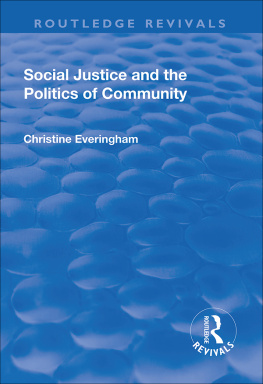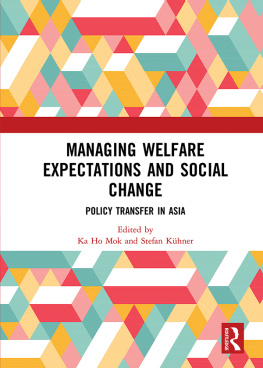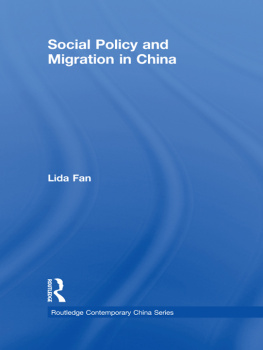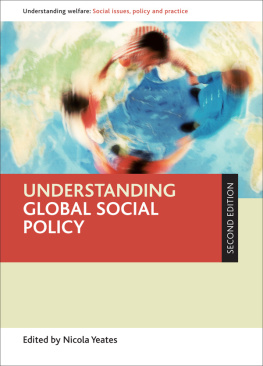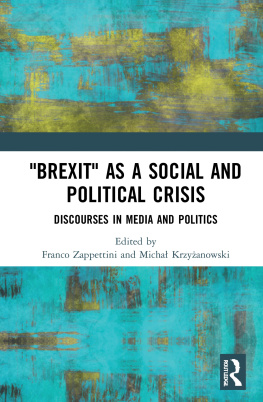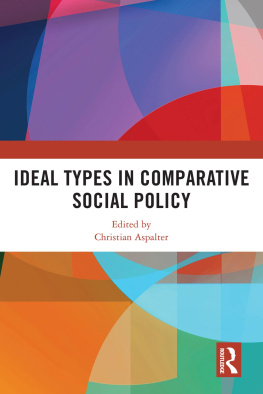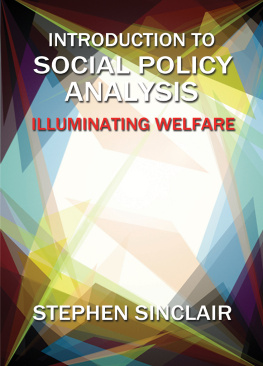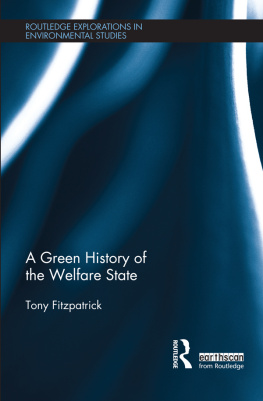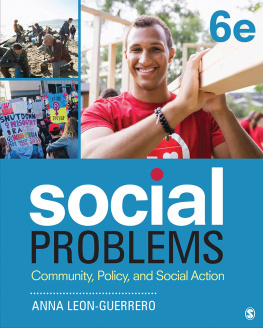First published 2003 by Ashgate Publishing
Reissued 2018 by Routledge
2 Park Square, Milton Park, Abingdon, Oxon 0X14 4RN
711 Third Avenue, New York, NY 10017, USA
Routledge is an imprint of the Taylor & Francis Group, an informa business
Copyright Christine Everingham 2003
Christine Everingham has asserted her right under the Copyright, Designs and Patents Act, 1988, to be identified as the author of this work.
All rights reserved. No part of this book may be reprinted or reproduced or utilised in any form or by any electronic, mechanical, or other means, now known or hereafter invented, including photocopying and recording, or in any information storage or retrieval system, without permission in writing from the publishers.
Notice:
Product or corporate names may be trademarks or registered trademarks, and are used only for identification and explanation without intent to infringe.
Publishers Note
The publisher has gone to great lengths to ensure the quality of this reprint but points out that some imperfections in the original copies may be apparent.
Disclaimer
The publisher has made every effort to trace copyright holders and welcomes correspondence from those they have been unable to contact.
A Library of Congress record exists under LC control number: 2003052118
ISBN 13: 978-1-138-71743-5 (hbk)
ISBN 13: 978-1-315-19693-0 (ebk)
Contents
The book developed originally from a series of lectures I gave to Masters of Public Policy and Applied Social Research students at Macquarie University, New South Wales. The majority of these students were working in social welfare agencies and public policy advisory units. Their feedback on the first draft was invaluable.
I must also thank the many health and welfare agency workers I have known throughout the period examined in the book. The historical account of the transformation of Australian welfare communities draws heavily on my own experience as a volunteer support mother during this time and my ongoing contact with workers in the field, both professional and volunteer.
The theoretical underpinnings of the book were considerably enhanced through lively discussions with my colleagues at Macquarie University - Professor Mitchell Dean, Professor Anna Yeatman and Dr Pauline Johnson. While we were often in disagreement, the enthusiasm they showed for the project helped keep it alive and their input ensured a higher level of academic rigour.
My current colleagues in the School of Social Sciences at The University of Newcastle have also offered me considerable support during various revisions of the book. In particular I would like to thank Emeritus Professor Lois Bryson, Professor Geoffrey Samuel, Associate Professor David Rowe, Dr Deborah Stevenson, Dr Penny Warner-Smith and Dr Ellen Jordan. I must also acknowledge the debt that I owe to Richard Lever, who worked with me on the final draft of the book, giving me valuable feedback of a literary nature as well as hints on presentation and style.
My work as a volunteer in the community sector, and my years of study and teaching at university were enthusiastically supported by my family. I owe an enormous debt to my husband, who passed away just prior to the books completion, and my wonderful children who gathered around me with such loving support at this difficult time. We have all grown in love and wisdom through this experience and have gained a much deeper insight into the importance of family and community.
Part I
Challenging Narratives of Community Decline
Introduction
In his influential treatise on the state of community in the United States, Robert Putnam (2000) warns readers about a treacherous enemy in our midst:
For the first two-thirds of the twentieth century a powerful tide bore Americans into even deeper engagement in the life of their communities, but a few decades ago - silently, without warning - that tide reversed and we were overtaken by a treacherous rip current. Without at first noticing, we have been pulled apart from one another and from our communities over the last third of the century. (Putnam, 2000, p.27)
Encountering this kind of rhetoric used by Putnam, readers might be wondering what the treacherous enemy force is that has so pulled us apart. Is it a pandemic disease, a fifth-column attack or an alien invasion that threatens our very existence? Fortunately, Putnams treacherous force is more mundane: social activism, libertarianism, social justice campaigns, and the desire for more inclusive communities based on a respect for human rights and cultural diversity. These cultural currents emanated from the new social movements in the 1960s. They shaped the mind set of the generation of Baby Boomers, largely held responsible by Putnam for communitys decline.
The fact that Putnams work, along with others that promote the same values, is enjoying such tremendous popularity in the mainstream press and political debates, as well as across a wide range of academic disciplines, indicates that his version of the events of the latter third of the twentieth century is deeply political and value-laden. His narrative provides a very influential lens for viewing the climatic events which shattered the old world order over the last few decades of the century. Is it also shaping the way we understand the construction of the new?
Discourses of community are a useful rhetorical tool for such a hegemonic project. This is because the word itself is quite empty of any meaning in particular. The word community reveals nothing about the we that makes it up. The community that Putnam describes as declining is problematic for this very reason; the we is an unexamined entity. This suggests that there is an urgent need to examine the contemporary discourses of community that are being used so prolifcally in public policy debates. What kind of community has declined, and what kind of community are the many and varied discourses of community attempting to re-constitute?
Putnams narrative of community decline resonates with the current mood of community nostalgia which seeks to address the fragmentation of todays social order by resurrecting the traditional family values of the 1950s. These are the very values, however, which isolated families in the suburbs and oppressed women and minority groups. They were challenged by the libertarian social movements of the 1960s for the way in which they relied on a repressive and hierarchical social order which was unable to accommodate cultural difference and gender equality. While Putnams narrative locates the offspring of these movements as responsible for turning around the spirit of community, I locate the progeny of the new social movements as creators of new forms of community. During the era Putnam identifies as turning the tide of community spirit, the offspring of the new social movements were identifying the very same communities as sites of oppression. They became locations around which new forms of community were mobilized, built on libertarian values and principles of social justice.
The activists who sprung from the cultural currents of the 1960s did not valorize the spirit that connected the communities of the day; rather they saw these connections as based on social exclusion and repression. The community spirit identified by Putnam was not mourned by the community activists of this period, but challenged precisely for this reason. The communities identified by Putnam as being in decline were not socially inclusive and they relied too heavily on repression for their social glue.

